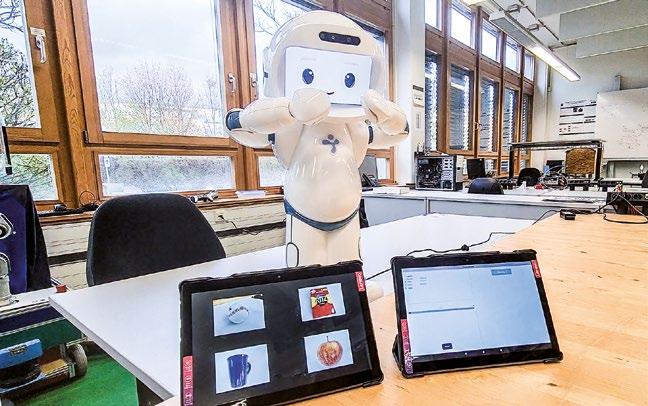
3 minute read
H-BRS graduates are successful and satisfied
Playfully training emotional skills
Artificial intelligence to support children with autism spectrum disorders
Correctly interpreting and understanding the emotions of others to adapt to social interaction is not a problem for most people. However, those who suffer from autism spectrum disorder (ASD) have difficulties doing so since their natural understanding for the feelings of others is not sufficiently developed. This is often compounded by impairments in a person’s own communication and language. It is not uncommon for these developmental disorders to manifest in early childhood.
Today, a wide range of therapies is available to treat this disorder. Researchers at H-BRS want to supplement the existing options through artificial intelligence (AI). In the scope of the MigrAVE research project launched in 2020, Ph.D. student Alex Mitrevski and research assistant Mohammad Wasil are conducting research on a robot learning assistant for the therapy of children with ASD under the direction of computer science professor Paul G. Plöger. “The robot is intended to be used as a supplement in therapeutic practice and to strengthen the children’s emotional competence in a playful way”, says Mitrevski, explaining the goal of the project, which is funded by the Federal Ministry of Education and Research. MigrAVE focuses on children diagnosed with ASD, as early treatment could improve their lives. One research focus is multilingualism to provide the best possible support for children whose native language is not German.
In addition to the robot learning assistant, the MigrAVE team is developing an online platform specifically for children with a migration background. H-BRS is working closely on the project with FH Münster and RFH University of Applied Sciences Cologne. This allows three fields of research to be combined. Münster contributes expert knowledge on autism, Cologne on multilingualism and emotion recognition, and H-BRS provides expertise on applied AI. “I’m pleased to be part of this interdisciplinary cooperation project. MigrAVE is a great opportunity for applied research”, says Mitrevski.
Cyber defence made in NRW
State government finances two new computer science programmes
Future IT security specialists will come from the region. Cyber Campus NRW, in which Hochschule Bonn-RheinSieg and Hochschule Niederrhein are working together, will provide the urgently needed, next-generation talent locally. Each will receive three million euros in funding from the state government to establish a total of two degree programmes with 250 places and up to five additional professorships.
The partners are pursuing similar, yet independent paths. In Sankt Augustin, the technically focused Bachelor’s degree programme Cyber Security & Privacy will launch in winter semester 2021/22. Amongst other topics, it will deal with data protection and IT law, web and application security, applied cryptography and IT forensics, i.e. the recovery and investigation of digital material. In Krefeld, students started the degree programme Cyber Security Management in winter semester 2020/21. The programme is intended to enable students to recognise and combat cyberattacks, create risk analyses and develop strategies for preventing security incidents. Supplementary Master’s degree programmes are to follow.
Two universities, one joint course
Even though these are two separate programmes, they are networked, and both appear under the project name “Cyber Campus NRW” with a shared web presence. Individual modules from one programme will be recognised in the other, for instance. “This is an interesting option, especially in times when studying is increasing digital”, says Professor Wolfgang Heiden, Dean of the Department of Computer Science at H-BRS. In addition, the lecturers at both universities actively exchange ideas in teaching and research. Preparations for establishing an Institute for Cyber Security & Privacy for research projects are also underway in Sankt Augustin.
Wolfgang Heiden is sure that the programme graduates will be in high demand on the labour market. “There’s a great need for such a qualification, both in large companies and in SMEs.” The same applies to institutions and public authorities. Talks on cooperation opportunities are being held with municipal computer centres, IT service providers, energy suppliers and hospitals. This way, teaching is close to practice and students can establish contacts with future employers at an early stage.










